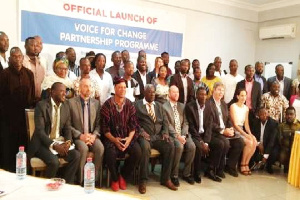Regional News of Thursday, 1 October 2020
Source: GNA
SNV Ghana empowers CSOs to serve as sustainable development advocates
The Netherlands Development Organisation (SNV), through its Voice for Change Partnership (V4CP) Programme, has empowered 12 Civil Society Organisations (CSOs) to serve as sustainable development advocates.
Through the five-year implementation period of V4CP, SNV worked with the CSO partners, strengthening and enhancing advocacy towards policy formulation in three thematic areas of Food and Nutrition Security, Renewable Energy, and Water, Sanitation and Hygiene (WASH).
The project is co-implemented with the International Food Policy Research Institute (IFPRI).
Its focus is on five thematic areas; access to sustainable nutrition, post-harvest loss reduction, improved clean cooking, access to off-grid electrification, and sustainable sanitation and hygiene.
The VC4P aimed at strengthening CSOs to advocate for an enabling environment in which Governments and Businesses provide good and affordable services for low-income segments in society.
They include knowledge and capacity building, workshops and accountability forums, town hall meetings, coaching, evidence-generation, lobbying, funding support, and baseline studies.
The WASH component under V4CP focused on increasing equity and access to sustainable, equitable and affordable WASH services and products.
The Food and Nutrition Security also focused on Sustainable Nutrition for All (SN4A) with an emphasis on Gender and Nutrition-Sensitive Value Chains and also on Post-Harvest Losses.
The Renewable Energy component touched on increasing access to clean cooking and heating as well as access to off-grid electrification.
Speaking at the V4CP closure and learning event in Accra, Mr Anjo Van Toorn, SNV Country Director, said SNV had collaborated with international and national partners, leading and facilitating engagements that were results-driven to enhance access to basic services.
He noted that V4CP had strengthened the capacity of not just the CSOs partners to engage and hold government accountable, but also created a platform for CSOs to interact with municipal and district assemblies.
The Country Director emphasized that the change included the creation of the district and municipal sanitation and hygiene advocacy teams, gazetting and enforcement of sanitation bye-laws and facilitating the establishment of 98 new clean cooking technology distribution outlets across five districts.
Ron Strikker, the Netherlands Ambassador to Ghana, encouraged CSOs to deliver quality services and make government more accountable to the citizens. They should also contribute to greater social cohesion, stronger and more open democracies, a better response to environmental problems, a better business climate, and more opportunities for all.
Madam Nora Ollennu, Chief Executive Officer of Intervention Forum, who represented the CSOs, said frequent unplanned transfers of key staff of local Assemblies continued to hinder smooth implementation of programmes by CSOs.
“We recommend that District Assemblies should ensure proper documentation and knowledge sharing of project training and findings to enable sustainability in gains made to boost increased technical know-how and experience in dealing with issues at the local level,” she added.
Entertainment










